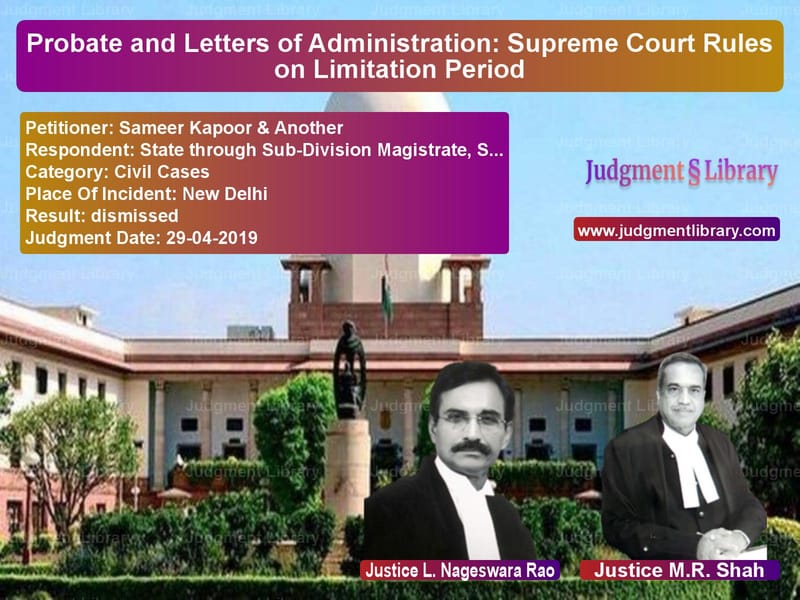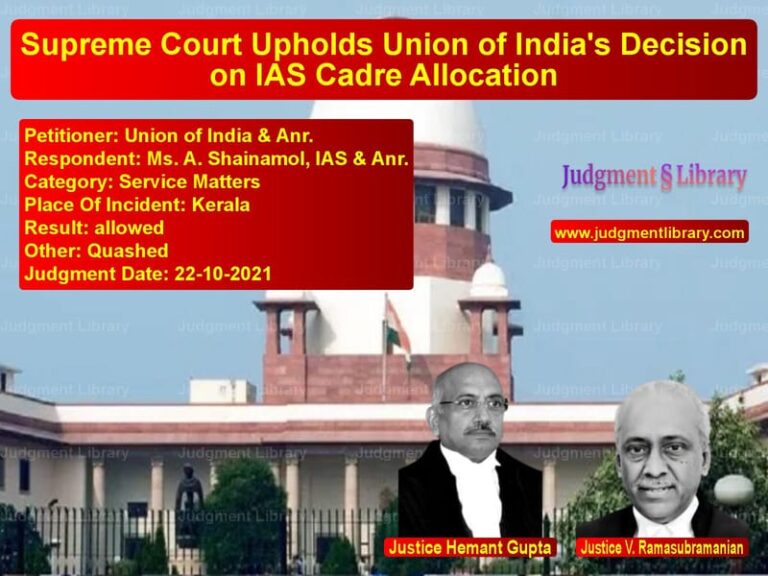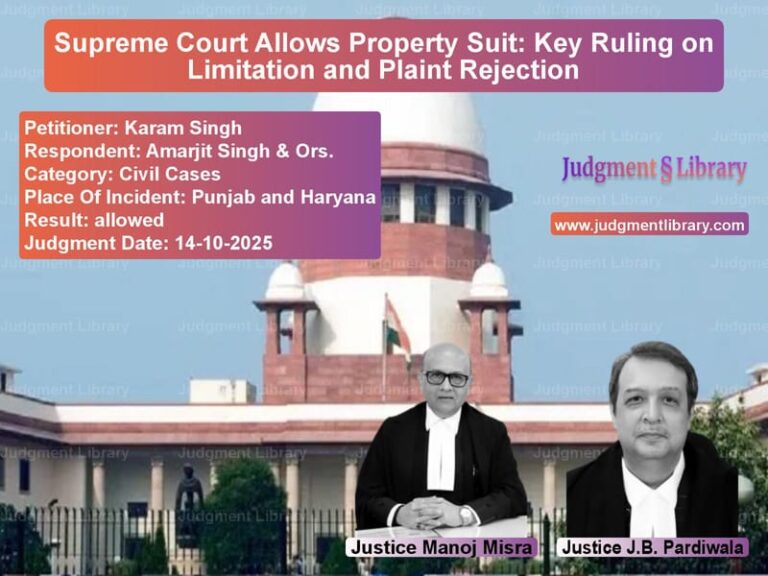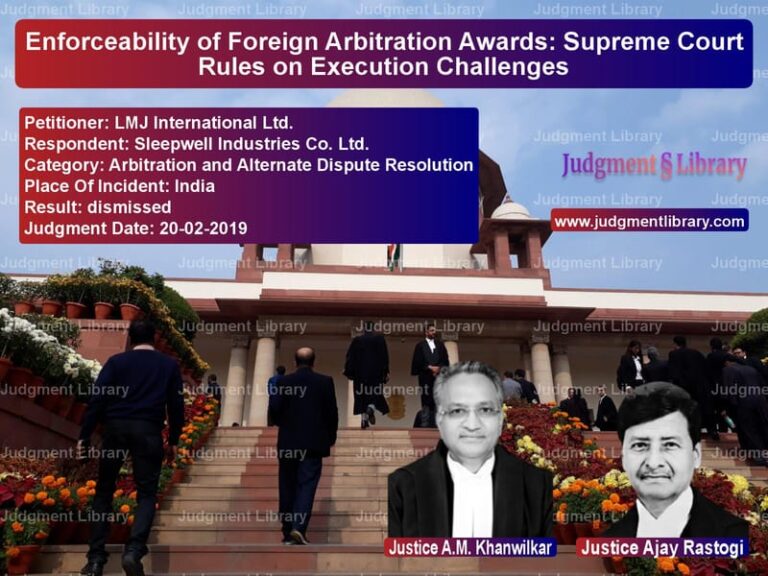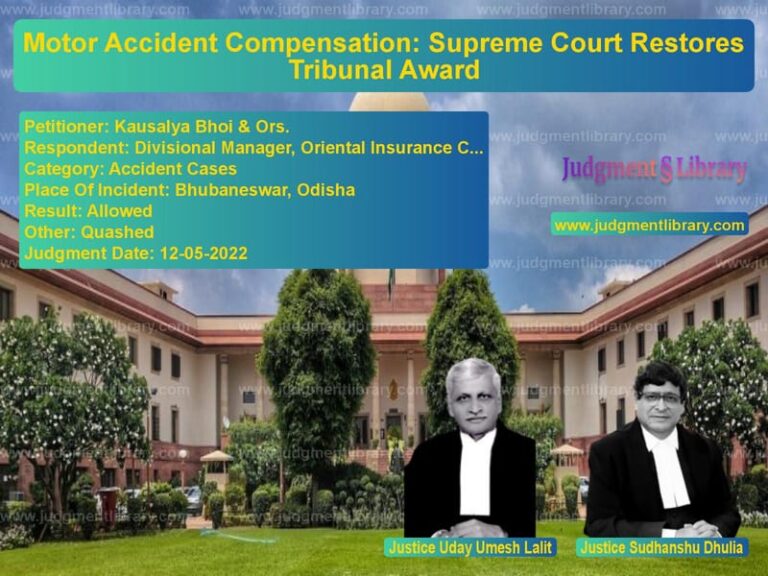Probate and Letters of Administration: Supreme Court Rules on Limitation Period
The Supreme Court of India has upheld the decision of the Delhi High Court, ruling that an application for letters of administration under Section 228 of the Indian Succession Act is not barred by the limitation period under Article 137 of the Limitation Act, 1963. The judgment provides clarity on the applicability of limitation laws in testamentary cases and probate matters.
Background of the Case
The case concerns a legal dispute over the will of Smt. Kailash Kapoor, a permanent resident of England, who passed away on September 10, 2001. She had executed a will on May 16, 1990, bequeathing all her assets to two of her grandchildren. The High Court of Justice, District Probate Registry of Birmingham, England, granted probate of the will on November 21, 1997.
In 2001, the respondent (at whose instance the will was probated in England) applied for letters of administration for property situated in Delhi under Section 228 of the Indian Succession Act. The appellants, legal heirs of the deceased, opposed this application and filed for rejection of the plaint under Order VII Rule 11 of the Civil Procedure Code (CPC), arguing that the petition was time-barred under Article 137 of the Limitation Act.
The learned Single Judge of the Delhi High Court rejected the application, ruling that Article 137 was not applicable to petitions under Section 228 of the Indian Succession Act. The Division Bench of the High Court upheld this decision, leading to the present appeal before the Supreme Court.
Key Legal Issues
- Whether Article 137 of the Limitation Act applies to applications for probate or letters of administration.
- Whether the limitation period for an application under Section 228 of the Indian Succession Act starts from the date of the grant of probate by a foreign court.
- Whether the Delhi High Court erred in dismissing the application under Order VII Rule 11 of the CPC.
Arguments Before the Supreme Court
Appellants’ Contentions:
- The appellants argued that Article 137 of the Limitation Act applies to all petitions filed under any Act before a civil court, including those under the Indian Succession Act.
- They contended that once a probate is granted in a foreign court, any subsequent application for letters of administration must be filed within three years from the date of the foreign probate order.
- The appellants cited the Supreme Court’s ruling in Kunvarjeet Singh Khandpur v. Kirandeep Kaur (2008) to support their contention that probate petitions are subject to limitation.
- They argued that since the respondent applied for letters of administration in 2001, more than three years after the 1997 probate order from the UK, the petition was time-barred.
Respondents’ Counterarguments:
- The respondents contended that Article 137 does not apply to applications for probate or letters of administration, as these are proceedings in rem (affecting all persons) rather than in personam (affecting specific individuals).
- They argued that the right to apply for letters of administration is a continuous right and can be exercised at any time.
- They distinguished Section 228 of the Indian Succession Act from Section 276, asserting that Section 228 applies to wills that have already been authenticated by a foreign court and do not require fresh proof.
- They asserted that the probate granted in England did not automatically extend to Indian jurisdiction, necessitating a fresh application for letters of administration.
Supreme Court’s Observations
The Supreme Court thoroughly analyzed the relevant legal provisions and past judgments on the matter. It made the following key observations:
- “The right to apply for probate or letters of administration is a continuous right that can be exercised at any time.”
- “Probate proceedings are in rem and not subject to strict limitation periods applicable to ordinary civil suits.”
- “Article 137 of the Limitation Act applies to applications made under the Indian Succession Act, but the limitation period starts only when the necessity to apply arises.”
- “A will that has been proved in a foreign court must still be authenticated in India, and an application under Section 228 is a valid means to seek such authentication.”
The Court referenced past rulings, including:
- Krishan Kumar Sharma v. Rajesh Kumar Sharma (2009), affirming that Article 137 applies to probate applications but does not restrict the right to apply.
- Vasudev Daulatram Sadarangani v. Sajni Prem Lalwani (1983), holding that probate applications are continuous rights and not necessarily time-barred.
- S. Krishnaswami v. E. Ramiah (1991), distinguishing between fresh probate applications and those under Section 228.
Final Judgment
The Supreme Court dismissed the appeal, upholding the High Court’s ruling that:
“Applications under Section 228 of the Indian Succession Act are not barred by limitation, as the right to apply is a continuing right. The appeal is accordingly dismissed.”
Conclusion
The judgment clarifies that an application for letters of administration under Section 228 is not automatically barred by limitation. It reinforces the principle that probate matters are in rem and provides legal heirs with the flexibility to authenticate foreign wills within Indian jurisdiction. This ruling sets an important precedent for future cases concerning testamentary succession and probate disputes.
Petitioner Name: Sameer Kapoor & Another.Respondent Name: State through Sub-Division Magistrate, South, New Delhi & Others.Judgment By: Justice L. Nageswara Rao, Justice M.R. Shah.Place Of Incident: New Delhi.Judgment Date: 29-04-2019.
Don’t miss out on the full details! Download the complete judgment in PDF format below and gain valuable insights instantly!
Download Judgment: Sameer Kapoor & Anot vs State through Sub-Di Supreme Court of India Judgment Dated 29-04-2019.pdf
Direct Downlaod Judgment: Direct downlaod this Judgment
See all petitions in Succession and Wills
See all petitions in Property Disputes
See all petitions in Contract Disputes
See all petitions in Judgment by L. Nageswara Rao
See all petitions in Judgment by Mukeshkumar Rasikbhai Shah
See all petitions in dismissed
See all petitions in supreme court of India judgments April 2019
See all petitions in 2019 judgments
See all posts in Civil Cases Category
See all allowed petitions in Civil Cases Category
See all Dismissed petitions in Civil Cases Category
See all partially allowed petitions in Civil Cases Category

